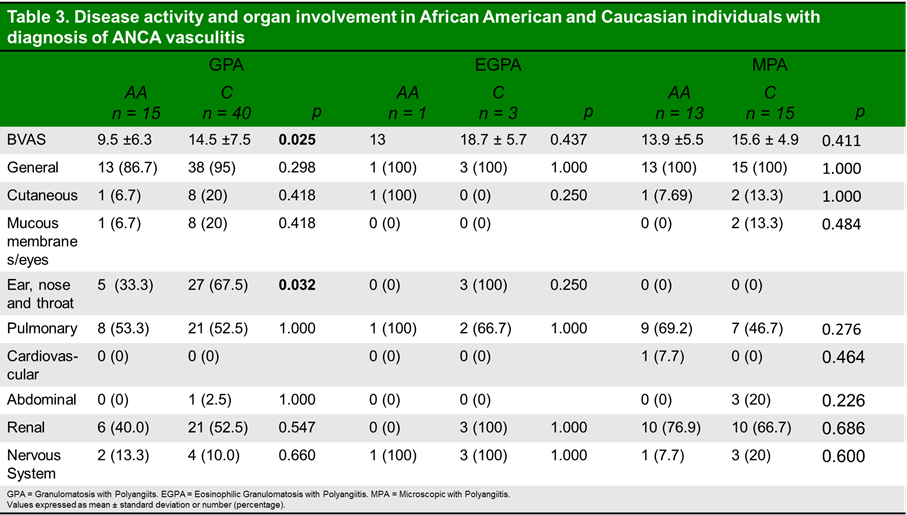Session Information
Session Type: ACR Poster Session B
Session Time: 9:00AM-11:00AM
Background/Purpose: Little is known about the presentation, clinical features, and prognosis of ANCA-associated vasculitis (AAV)in non-Caucasian populations. More specifically, there is a paucity of studies in US African-Americans (AAs). Some studies have described that AA race as a predictor of resistance to treatment and relapse. Little else is known about how AAs present when affected by AAV. The objective of this study is to describe the clinical characteristics of AAV in AAs in comparison to Caucasians.
Methods: Retrospective cohort analysis of patients with AAV diagnosis vasculitis per ICD-9 codes (446.0, 446.4, 447.6) during a 12-year period (2003-2015). Variables analyzed included: sex, age, duration of symptoms, time to diagnosis, ANCA antibodies, serum creatinine and organ involvement based on BVAS score. Disease severity was assessed European Vasculitis Study Group definitions. Treatment agents (steroids, DMARDs, biologics) and requirement of renal replacement therapy were recorded. Caucasians controls were chosen randomly with a 2:1 ratio with AA individuals. Fisher’s exact and Wilcoxon two-sample test were used for the analysis categorical and continuous variables, respectively.
Results: 29 cases of AAV in AAs were confirmed. AAs were younger at the time of diagnosis (44.3 [31.0-55.0] vs 56.0 [50.0-68.0], p= 0.002). There were no differences in frequencies of AAV disease subsets, ANCA antibodies, disease severity, or most organ involvements between AAs and Caucasians (Tables 1-3). AAs with GPA had less disease severity as measured by the BVAS score (9.5 ±6.3 vs 14.5 ±7.5 p=0.03)
Conclusion: Few differences were found between US AAs and Caucasians with AAV. These included younger age at presentation and less disease severity in AAs with GPA. Even though generalizability of these results is limited by the small size and retrospective nature of this cohort, this is the first study that describes differences in AAV in AA individuals. 
To cite this abstract in AMA style:
Sattui S, Westfall A, Gaffo AL. Presentation and Clinical Features of ANCA-Associated Vasculitis in US African Americans: Experience from a Single Center [abstract]. Arthritis Rheumatol. 2016; 68 (suppl 10). https://acrabstracts.org/abstract/presentation-and-clinical-features-of-anca-associated-vasculitis-in-us-african-americans-experience-from-a-single-center/. Accessed .« Back to 2016 ACR/ARHP Annual Meeting
ACR Meeting Abstracts - https://acrabstracts.org/abstract/presentation-and-clinical-features-of-anca-associated-vasculitis-in-us-african-americans-experience-from-a-single-center/


